Day 1: Misti Volcano
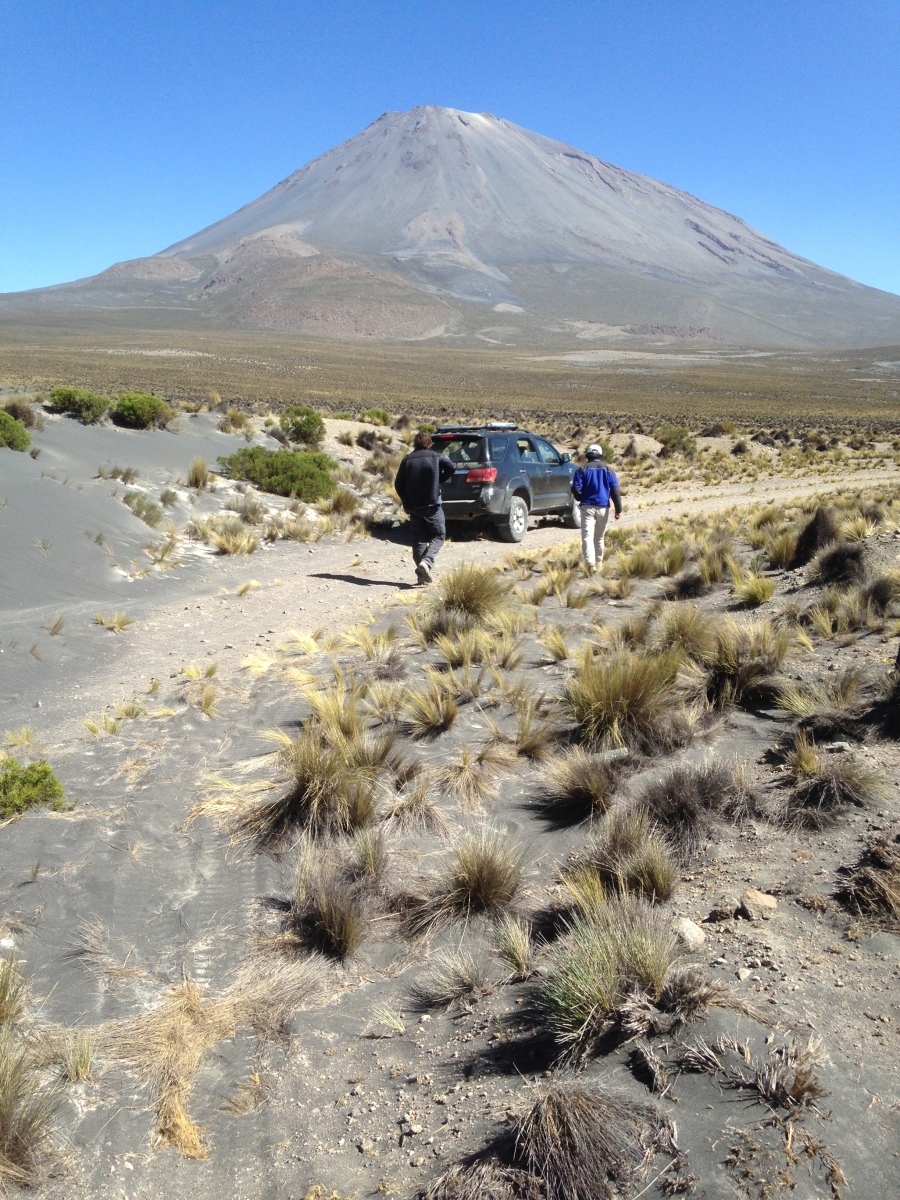
While Colca Canyon is by no means an easy trek, it did not break any new ground for either of us. Arid canyons, steep trails and multi-day hikes at elevation were all things we had done in the past, thresholds we had crossed before. But the next hike promised to push us far past the limits of anything we had previously done.
I knew that the entire trip would revolve around Misti. At 19,101 feet Misti is BIG, and very exposed. Little that grows on its ashen flanks will stop the wind. Altitude and weather are the primary obstacles, and while we had some experience with both, this massive volcano would demand much more. Misti surpassed by over 3000 feet anything I had ever climbed. The night we would spend at base camp would be the highest we ever slept. Wind chills at the summit were consistently below freezing. I had done big volcanoes before, but they were still HALF this size. I knew that Misti lies near the boundary of what we can reasonably hope to achieve. The question was, what side of the boundary? Was it possible, or did it lie on the side of the impossible?
Could we really hike this formidable mountain?
The early signs were not auspicious. We had yet to talk to the actual guide. Our guide for the Colca trek, Eli, would be coming along with us, though not in an official capacity; she had never climbed Misti. We also kept getting mixed signals from the travel company about the amount of water we would need. Was it three liters, four, five of six? Each time the figure was mentioned it seemed to keep going up. And what exactly would the guide do, and what would be provided and what would not? This is never a sure bet in Peru. The tour company had promised us one thing; the guide might say another. Much depended on the guide, whose expertise would bring us to the top of Misti and (more importantly) back safely.
In Chivay, where there is nothing resembling an outdoor outfitter, we attempted to do what we could to prepare. We expected to carry 5 liters of water each. This is a full 11 pounds in addition to our other gear. Reading this, it probably doesn’t sound like much, but try humping it up a steep slope at altitude. One of the main challenges with Misti is there are no water sources at all; if you run out, you are in trouble. And you need a lot of water to summit a big mountain in a dry climate.
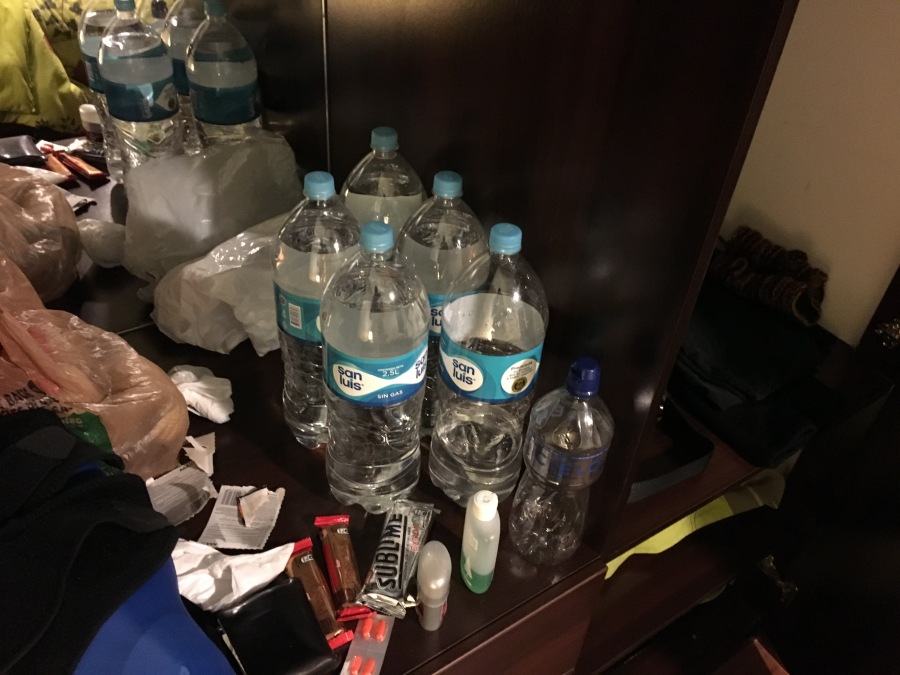
We also added as many warm layers as we could, which meant visiting the local marketplace in Chivay looking for anything that might suffice to keep us warm. Fortunately, alpaca wool was not in short supply. We went to bed that night not really knowing what to expect. If all went as planned, the next night would be spent in bivouac at 15,700 feet.

At 8 am the next morning we set out with our packs full of weighty water jugs and hand-knit alpaca gear. Even the hotel stairs was a challenge with that much gear. Our driver, Esteban, who ranks with Mad Max as the world’s greatest off road truck driver, met us with Eli at the door to our hotel. The road to Misti crosses the bleak, windswept pass of Patapama, a lofty viewpoint from which a horizon full of sinister looking volcanoes can be seen at eye level. Here we crossed paths again with Peru’s most active volcano, Sabancaya…this time staring directly at it while it spewed plumes of grayish ash thousands of feet into the air. You can get a good look at it in the picture below.
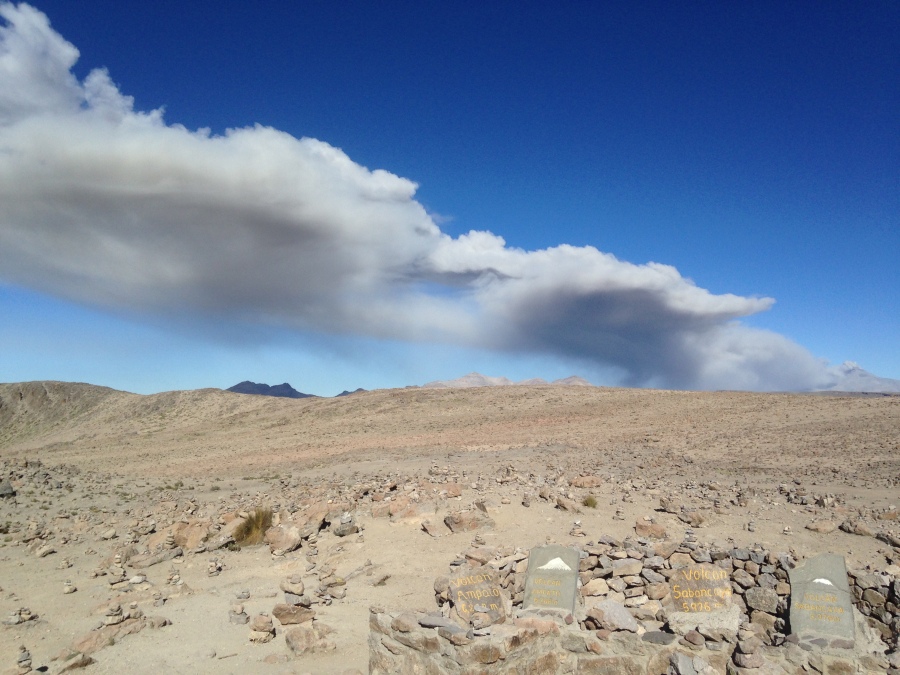
From here we dropped down to a truck stop in the remote desert which presented a fine view of Misti looming like a watchtower over a desolate plain. After drinking some coca tea, known for making the effects of altitude sickness less harsh, Esteban roared back onto the highway to reach our our rendezvous with our guide for Misti, which happened to be at a police check point so remote I doubt if it exists on any map. The guide was a man named Angelito whom we had yet to meet. He was coming all the way down from Arequipa to link up with us.
But after 45 minutes he did not show, and both Esteban and Eli began to watch the road with growing unease. We also began to feel apprehensive…he did not answer his phone. Had he missed the message? Had his ride broken down? Was this to be the end of our trek?
But eventually Angelito showed up, carrying nothing but an ice axe (his gear was already in the car, having been brought up by Esteban the night before.) He greeted us, hopped in and it was on to Misti.
It took a good hour from there to reach the drop-off point, crossing paths with huge herds of Llama, Alpaca, Viacuna and even a few rarely soon Guanacos. The dirt portion of the road was in good shape; the truck only got stuck once in ash (this was in sharp contrast to the “road” we took out later on, but that’s a subject for later.)
Once we had started to gear up another miscommunication developed. Angelito expected us to carry the bulky mountaineering tent to the summit ourselves. While not an unreasonable request, this was NOT what we had been told by the travel agency, and all our calculations had been based on this. Burdened under a heavy tent as well as the water and gear, I was not sure I could make it.
But Sylvia quickly ironed things out with Angelito and he agreed to carry the tent for us, probably cursing either us or the travel agency as he did so. But he was polite about it, and after a short delay while I managed to impale my fingers on what looked like grass but was more like porcupine quills, we were off.
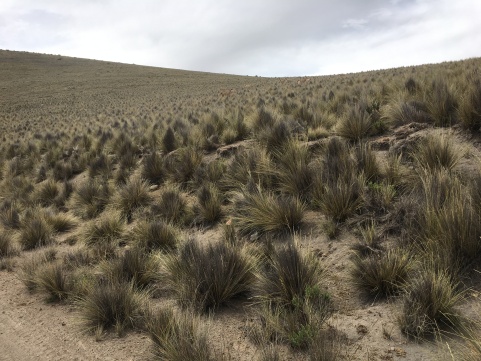
Angelito had chosen the Northeastern Aguada Blanca route to the summit (You can read a detailed description of this route written by the blogger Rick McCharles on his website BestHike.com.) This route is considered to be the safest and easiest route up the mountain. On the drive in, while we stopped to view some odd-looking rock formations near the road, he had told me this was his first trip on Misti this year. He also quizzed me about what had brought us to Misti and what preparation we had done. Angelito seemed skeptical of our level of acclimatization, and perhaps justifiably so. His opinion seemed to be that a week was necessary to fully prepare for Misti, but then, with altitude you never know.
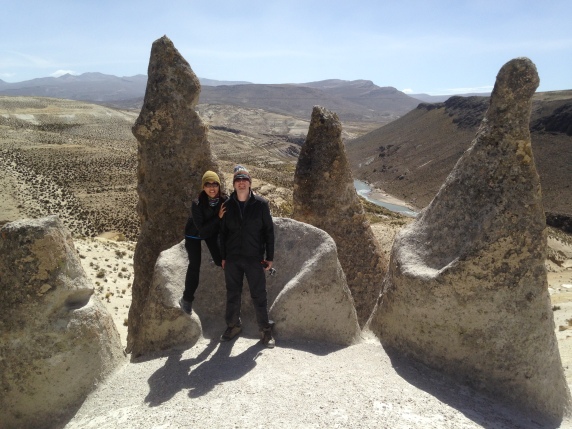
Angelito set a very slow but steady place; imagine how you would walk trying to carry a piano on your back. His method was to go very slow, but without stopping, and take long but infrequent rests. There was no trail; we went straight across dunes of jet black ash the consistency of Talcum powder, interspersed with tufts of the porcupine grass. Nothing blocked the wind; when it whipped up, it lashed our faces crosswise like sandblasting. It was step, step, step, slide backward and step again.
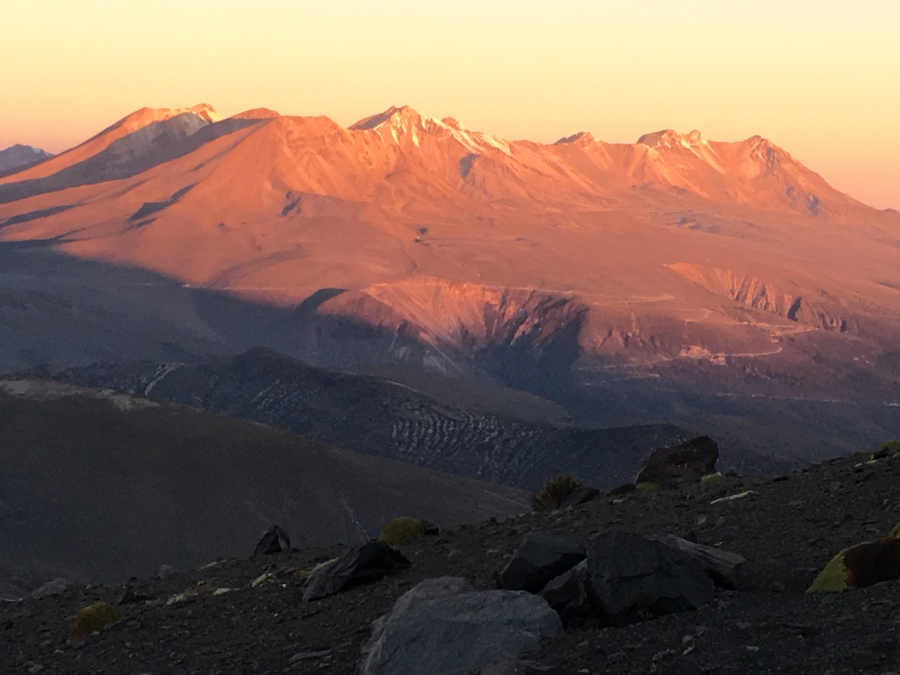
At the 45 minute mark we stopped for a break, and then again at about the 90 minute mark. By the second break, which was also the last, Sylvia was clearly struggling. I had hit my stride, but Sylvia was stumbling forward awkwardly, reeling from altitude and the heavier than expected pack.
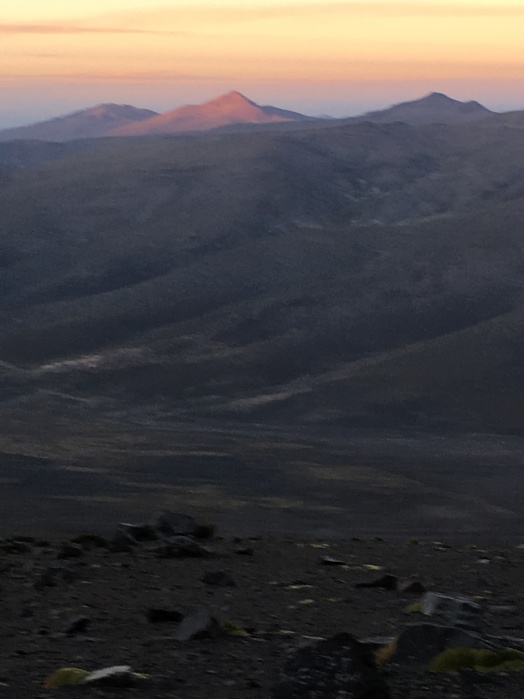
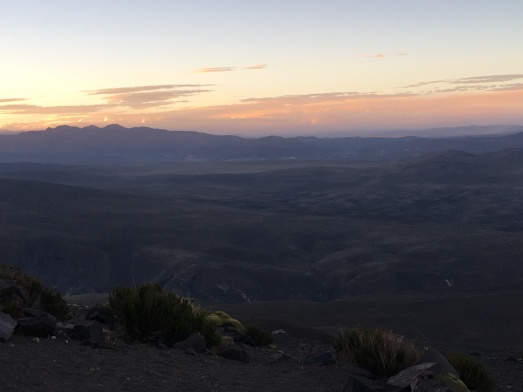
By the time we reached the windswept ridge of the final approach I was shouting encouragement to Sylvia over the wind with virtually every faltering step, urging her onward toward the rocks that marked the camp. The howl of the wind grew higher and my slogan shouting became drown out beneath it. But we had made it finally. I was little worse for wear but Sylvia was exhausted and quickly retreated into the tent that the guides had just finished setting up. At that point, I was entirely convinced that with some rest Sylvia would recover and we would summit. I pulled out the GoPro for a quick filming of the remarkable sunset, and then dove into the tent myself to get as much sleep as I could. Angelito had already stated that most people don’t sleep much at 15,700 feet.
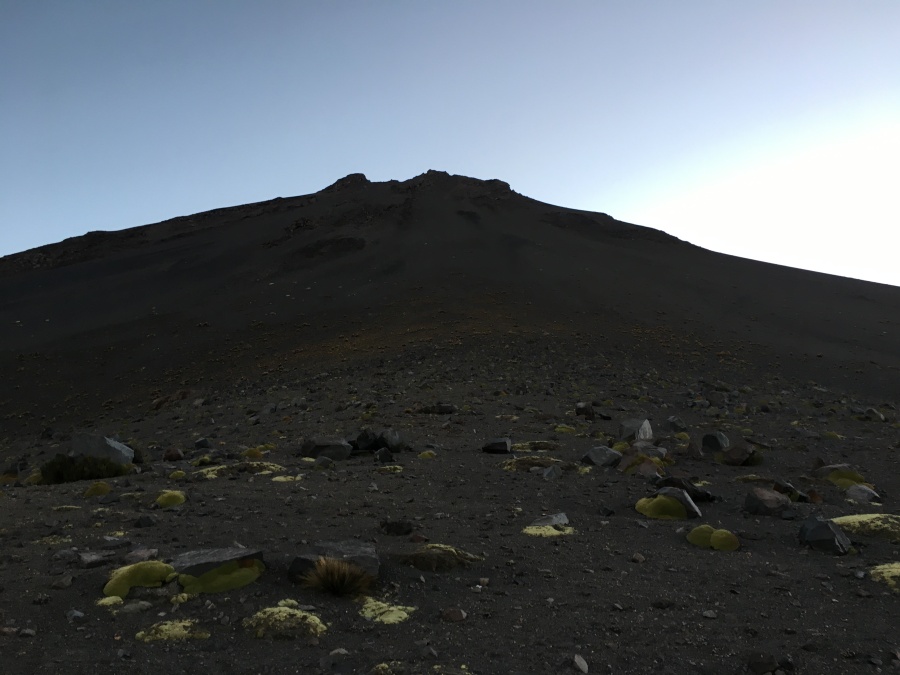
The fun would begin at 1 am when we would be roused for breakfast/dinner followed by the summit attempt, with us arriving at the summit in time for sunrise.
See our video of the Misti hike, Day 1!
Next Up: The Wrath of the Volcano